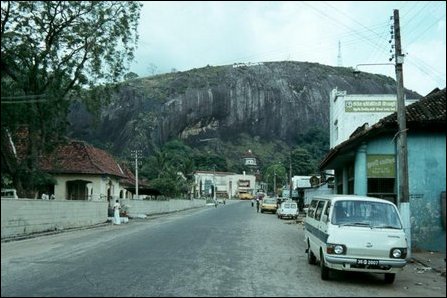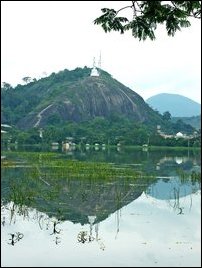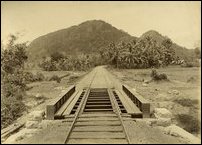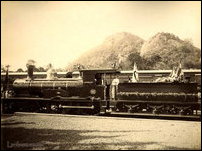Know the Etymology: 159
Place Name of the Day: Friday, 01 October 2010
Kuruwita, Kurunægala
குருவிட்ட (குறுவிடரி),
குருநகல (குறுங்கல்)
Kuruviṭa
KurunægalaKuru+wita
Kurunæ+gala
The small hill
The small rocky hill
| Kuru | (adjective) Small, short (Sinhala), Kuraa: (singular) Dwarf, pigmy (Sinhala); Kuroa, Kurun: Plural of Kuraa (Sinhala); Kurunæ: Another adjective form equivalent to Kuru (Sinhala place names); Ku’ru: (adjective) Short, dwarfish, stumpy (Tamil, Changkam Diction as well as modern, Dravidian Etymological Dictionary 1851); Short, little (Malayalam, DED 1851); Kuru-muni, Ku’ru-maka’l, Ku’ru-nari, Ku’ru-nakai: Examples of usage (Tamil); Ku’run, Ku’rum, Ku’rung: Other adjective forms of Ku’ru, meaning small, short etc., as in Ku’run-thokai, Ku’rum-palaa, Ku’rung-kai (Tamil); Ku’rumai: (noun) Shortness, smallness (Tamil); Ku’ri: (verb and noun) Being small, smallness (only in Changkam Tamil usage); Ku’ruka, Kun’ra, Ku’raiya: (verb) becoming small, short, diminutive, less (Tamil); Ku’ril: Short vowel (Tamil), Ku’ra’l: Short form, dwarf, pigmy (Tamil); Kuru: Short, concise brief, terse (Dhivehi / Maldivian). Also note that synonymous words such as Kuddam, Kuddi and Kuddai, meaning short, small, young, etc in Tamil and are related to Kudaa in Sinhala, Kuda in Dhivehi and Khuddaka in Pali / Prakrit, are also identified as Dravidian (DED 1670). |
| Wita | Mountain (Sinhala); Vidari, Vidam, Vi’ndu: Mountain (Tamil, only in Changkam Tamil diction, Dravidian Etymological Dictionary 5474); Betta, Bettu: Big- hill, mountain (Kannada, DED 5474); Betta: Big-hill, mountain (Kodagu, DED 5474); Bit, But: Mound, hillock (Brahui, DED 5474). |
| Gala | Stone, rock (Sinhala); Also a rocky hill or a rocky terrain in the context of place names (Sinhala); Gal: Plural of Gala, stone, rock (Sinhala); Kal: Stone, rock (Tamil, Malayalam, Changkam and modern diction, Dravidian Etymological Dictionary 1298); Also a toponymical component for places having a rocky hill or rocky terrain (Changkam and modern Tamil as well as Malayalam); Kallu: Equivalent to Kal (Tamil, Malayalam); Kal, Kalu, Kallu: Stone, also a place name component in the context of rocky hills (Kannada); The cognates of Kal, meaning stone, could be found in 19 Dravidian languages, including Brahui of Pakistan (DED 1298). See columns on Galoya, Bambaragala and Galle
|
The prefixes Kuru in Kuru-wita and Kurunæ in Kurunæ-gala, as adjectives, mean short or small in Sinhala.
The usage of these terms as alternative forms of adjectives could also be noticed in other examples of Sinhala place names such as
Kuru-goda (Kandy district) and
Kurunæ-goda (Kegalle district).
Kuru in Sinhala is closely related to the adjective Ku’ru in Tamil and Malayalam that is written and pronounced with a retroflex R and is identified as a Dravidian word by the Dravidian Etymological Dictionary, entry number 1851.
Ku’ru in Tamil / Malayalam, and Kuru in Sinhala and in Maldivian mean the same, i.e., short or small.
The use of the adjective Ku’ru in Tamil could be traced back to Changkam literature and Tamil Brahmi inscriptions.
Note the shades of meaning in the following usages in Tamil:
Ku’ru-nari: Fox (Natti’nai 164:9), the short Nari as differentiated from the big Nari, i.e. Tiger;
Ku’ru-muni: The short seer Akaththiyar;
Ku’ru-nakai: Smile as differentiated from laughter (Choo’laama’ni 1003);
Ku’ru-makkal: Small children (Kaliththokai 83: 8-10);
Ku’rum-maka’l: Young girl (Puka’loor Tamil Brahmi inscription);
Ku’run-thokai: Anthology of short verses, one of the Changkam literature;
Kurum-palaa: A short variety of jackfruit tree;
Kura’l: Small sized (Pu’ranaanoo’ru 28: 2);
Ku’ril: Short vowel (Tholkaappiyam 26:3);
Kun’ru: Small hill, hillock, what is smaller than a hill.
Ku’ri is a verb as well as a noun form found only in old Tamil of the Changkam literature (being short: Pu’ranaanoo’ru 129:1; shortness: Ku’runthokai 394:3).
Ku’rai (to be small, short, less etc) is the popular verb form in modern Tamil.
Another related set of words of the same meaning, traced to Dravidian etymology (DED 1670) and shared by Tamil, Sinhala and Maldivian is
Kuddam, Kuddi, Kuddai etc in Tamil,
Kudaa in Sinhala and
Kuda in Maldivian, meaning short or small.
Khuddaka in Pali / Prakrit is considered as borrowed from Dravidian (see DED 1670).
Kuda, meaning similar to Kuru, is also a popular place name component in Sinhala, such as in
Kuda-goda (small hill, Gampaha district) and
Kuda-gal-Aara (the river of the small rocky hill, Hambantota district). Such place names will be discussed in another column.
* * *The component Wita has several meanings in Sinhala. Among them the meaning mountain or hill is the only one applicable to the context of a place name suffix.
The suffix Wita is mostly found in the place names of the southwest part of the island.
The numbers given below district-wise are that of large villages having the component Wita in their names. Note the distribution patter: Gampaha dt: 16, Kegalle dt: 12, Ratnapura dt: 10, Ka’lutara dt: 10, Matara dt: 8, Kurunegala dt: 7, Galled dt: 7, Kandy dt: 7, Puththa’lam dt: 3, Colombo dt: 3, Matale dt: 2, Badulla dt: 1.
Close cognates of the Sinhala word Wita could be found in Old Tamil. These cognates, Vidari, Vidam and Vi’ndu, also meaning hill or mountain, are found only in the diction of Changkam Tamil literature and not in the usage of later times. They are listed as words of Dravidian etymology by DED (entry no 5474).
Some examples of the Tamil cognates could be seen in Natti’nai 26: 3-4, Kaliththokai 101:22, Akanaanoo’ru 235:5, Aingku’runoo’ru 57: 1, Mathuraikkaagnchi 202 and Pathittuppatthu 55:15, 88:22.
Related cognates having V / B interchange could be seen in some other Dravidian languages too: Betta, Bettu, mean big hill or mountain in Kannada and Kodagu, and Bet, But, mean mound or hillock in Brahui of Pakistan.
If rendered in old Tamil, Kuru-wita will become Ku’ru-vidari or Ku’ru-vi’ndu.
Cognates of such rare and long-forgotten Tamil / Dravidian terms being present in Sinhala place names provides key evidence for further research in understanding the peopling of the island and the formation of Sinhala and Eezham Tamil languages in new light.
* * *Gala, a very popular place name component in Sinhala, meaning rock or rocky hill in the context of place names, is an obvious cognate of Tamil / Dravidian Kal (DED 1298).
Cognates of this word are found in nearly 19 Dravidian languages including Brahui of Pakistan (DED 1298).
Gala (singular) and Gal (plural) in Sinhala, and Kal or Kallu in Tamil, Malayalam, Kannada etc, ordinarily mean stone. In the context of place names they mean a rocky place or a rocky hill.
Note the following examples: Kaar-kala (the dark rocky hill, Tulu, DK district, Karnataka), Mud-gal (the old rocky hill, Kannada, Raichur district, Karnataka), Aane-kal (the elephant rock, Kannada, Bangalore district, Karnataka), Eda-kallu (the rock of caves or the rocky hill in the middle, Malayalam / Kodagu, Wayanad district, Kerala), Muthu-kal (the old rocky hill, old Tamil place name Sanskritised later as Viruththaasalam, Tamil Nadu).
The Sinhala place name Kurunæ-gala, meaning short rocky hill, is an equivalent to Ku’rung-kal in Tamil.
See columns on
Galoya,
Bambaragala and
Galle.
* * *Kuruwita is a divisional headquarters in the Ratnapura district of Sabaragamuwa Province. It is at the foothill of the steep trail to Adam’s Peak and there is a small hill with prehistoric rock-caves on the top.
Kurunægala, usually written in English as
Kurunegala, is a district headquarters in the North Western Province. There is a small rocky hill at Kurunegala.
* * *
The short rocky-hill of Kurunegala (Photo courtesy: Nick Dowling, http://home.btconnect.com/dowconsult/)

The short rocky-hill of Kurunegala photographed from the lakeside (Photo courtesy: Sampath Muthunayake, http://www.panoramio.com/user/2459999)

Kurunegala photographed in 1909 from the side of the railway station and railway track (Image courtesy: Lankapura.com)
The short rocky hill, Padukka division, Colombo district
Kuru-goda: The short hill, Akurana, division, Kandy district
Kurunæ-goda: The short hill, Galigamuwa division, Kegalle district
Kuru-ambe-muduna: The small top or summit of mango trees (Muduna: the head, top, summit, peak, in Sinhala; Muthal: first, top, principal etc in Tamil, DED 4950), Kundasale division, Kandy district.
Kuru-wawa: The small reservoir, Rattota division, Matale district
Ku’ru-vil: The small pond, Maanthai West division, Mannaar district
Kuru-vil-ku’lama: The small pond, Rasnayakapura division, Kurunegala district
Kuru-gama: The small village, Wellawaya division, Moneragala district
Kura (equivalent to Kuru):
Kura-walana: The small forest, Attanagala division, Gampaha district
Kura-gama: The small village, Thumpane division, Kandy district
Kura-gala: The small rocky hill, Balangoda division, Ratnapura district
Kurale-wela: The small paddy field, Ridiimaliyadda division, Badulla district
Yak-kura-gala: The small rocky hill of spirits, Dambulla division, Matale district
Wita: Weli-wita: The sandy hill, Kaduwela division, Colombo district
Mala-wita: The hill of flowers, (Mal and Mala in Sinhala and Malar in Tamil are Dravidian cognates, meaning flower, DED 4739), Kegalle division and district
Riti-wita: The hill of Riti (antiaris innoxia) trees, Godakawela division, Ratnapura district
Meeyana-wita: The hill of beehives (Meeyan: beehive in Sinhala; Moy: swarm as of bees, flies etc in Tamil, DED 5030), Deraniyagala division, Kegalla district, also Kahawatta division, Ratnapura district
Hapu-wita: The hill of Hapu or Sapu trees (Michelia champaca, Cha’npakam in Tamil, Champakam in Malayalam, Sampige in Kannada and Chappaye in Kodagu, DED 2321), Kegalle division and district
Yakka-wita: The hill of spirits, Narammala division, Kurunegala district
Del-wita: The hill of wild breadfruit trees, Rideegama division, Kurunegala district
Thal-wita: The hill of palmyra palms (Thal in Sinhala is a cognate of Thaazh, Thaazhai, Thaazhi, for palmyra and some other palms in Tamil, DED 3180), Kurunegala division and district
Pokunu-wita: The hill having a waterhole or pool. (Poku’nu in Sinhala and Pokka’nai in Tamil are related to the Dravidian root Po, Poy etc, meaning a hole, DED 4452; also note Poykai, Pukkai, meaning natural spring, pond etc in Tamil, DED 4533), Horana division Kalutara district
Gala: Gala is one of the most popular components found in the Sinhala place names. Note the instances and distribution pattern among the names of larger villages in the following districts:
Kandy 65, Kurunegala 62, Galle 49, Kegalle 43, Kalutara 42, Ratnapura 38, Ampaa’rai 36, Matara 31, Hambantota 28, Matale 27, Gampaha 24, Moneragala 22, Badulla 20, Nuwara Eliya 19, Anuradhapura 19, Colombo 17, Polannaruwa 16, Puththa’lam 8.
First published: Friday, 01 October 2010, 02:57
Previous columns:














